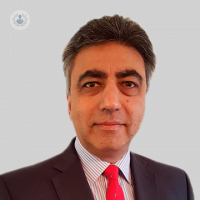Chronic diarrhoea in children causes when to get medical help
Autore:Chronic diarrhoea might be a sign of an underlying condition or it could simply be a temporary stage of a child’s developing digestive system. Fortunately, paediatric gastroenterologists, such as Dr Assad Butt, are on hand to alleviate the troubles associated with persistent diarrhoea and to support parents in helping their children with diagnosis and medical treatment. Learn from a leading professional about chronic paediatric diarrhoea causes and management.

What is chronic diarrhoea?
Often, people misinterpret what is medically classed as diarrhoea. If a child has one loose stool a day among regular stools, this would not be classed as diarrhoea. The condition is actually a combination of loose and frequent stools.
Diarrhoea is considered chronic when it persists for more than two weeks. If it lasts for less than two weeks, it is considered acute. For Dr Butt’s article on the management of acute diarrhoea, click here.
Regardless of if the diarrhoea is intermittent or continuous over the course of two weeks or more, it might suggest an underlying health condition.
What symptoms could indicate an underlying health condition?
If a child’s diarrhoea is chronic, it needs looking into. Things to consider are:
- Is there persistent abdominal pain?
- Are there concerns about weight & height? Such as has the child lost weight or slow to gain in height?
- Is there mouth ulceration?
- Is there a change in bowel habit?
- Is there blood in the stool?
These symptoms are red flags and indicate that you should seek medical assistance.
What are the most common chronic diarrhoea-causing conditions?
In cases of chronic diarrhoea, there is usually an underlying cause. The following are the most common conditions that cause chronic diarrhoea.
- Post-enteritis syndrome: After acute gastroenteritis (stomach bug/flu), it’s possible for children to have post-enteritis syndrome. This occurs when a bit of damage in the intestine continues for weeks or months after the acute infection. When the intestine heals, the diarrhoea should stop.
- Secondary lactose intolerance: Post-enteritis can damage the gut and in some children, this may lead to digestive enzymes not functioning well, particularly those that digest sugar from lactose products such as milk. When the child recovers from post-enteritis, the chronic diarrhoea should heal as well.
- Coeliac disease: For children and adults with coeliac disease, gluten irritates the bowel which, consequently, causes diarrhoea and can cause damage to the intestine if gluten continues to be consumed. Children with undiagnosed coeliac disease who eat gluten may have mouth ulceration, abdominal cramps and diarrhoea.
- Inflammatory Bowel Disease (IBD): If diarrhoea persists, it could be due to inflammatory bowel disease (IBD). This term refers to chronic diseases that cause inflammation in the digestive tract, such as Crohn's disease and ulcerative colitis.
- Irritable Bowel Syndrome (IBS): Not to be confused with IBD, irritable bowel syndrome (IBS) consists of abnormal movements in the muscles of the intestine. In 30-40% of patients with IBS, there’s a history of acute gastroenteritis in the past. A theory is that their gut microbiota has been altered.
What is toddler diarrhoea?
A child with chronic diarrhoea may not receive a diagnosis of the above conditions and could potentially have persistent diarrhoea due to their immature and still developing gut. Toddler diarrhoea is relatively common in healthy children and can occur in infants (children under a year old) but can also happen up until the ages of 5 or 6, typically. In this situation, a child may have bowel movements four to twelve times a day but is otherwise completely healthy; there is no serious cause for concern. There may be undigested food in the stool but despite this, nutrients are still absorbed and the child still grows. There is a theory that toddler diarrhoea is related to an immature gut which is still developing its function. The transit time of food through the digestive tract may simply be too fast but will eventually slow as the gut’s ability to function develops further. Sometimes, giving additional dietary fat (long-chain triglycerides) or as a fat supplement may help through their ‘intestinal braking’ action to slow transit.
Toddler diarrhoea could be due to fructose malabsorption, in which a child’s digestive system can’t yet handle high levels of fructose (sugar) from fruits and juices, for example. It could also be due to dairy intolerance. In some children, cutting back on dairy can help in reducing diarrhoea. In all cases of toddler diarrhoea, treatment can be given to alleviate symptoms until the gut matures. Usually, these symptoms resolve spontaneously by school age (age 5 to 6).
How is it managed?
Children, much like adults with chronic diarrhoea, will have their history taken and they will be examined to determine the underlying cause. Blood, stool and more specialist tests such as colonoscopy may be required to establish a diagnosis in your child to determine if the cause is IBD, IBS, post-enteritis syndrome etc. If a confirmed diagnosis is made, the appropriate treatment and care to manage the specific condition will be provided.
Can I stop flare-up of my child's chronic diarrhoea?
The reason for your child's diarrhoea flaring up would depend on the underlying diagnosis. Children with IBD can have flare-ups of the condition sporadically and sometimes can be triggered by infection or stress. Some children with IBS can experience constipation or an alternating case of diarrhoea and constipation. Whichever the case, this is often associated with a bellyache. A flare-up of symptoms can be managed in some instances with medication to prevent diarrhoea and to help with spasms of the bowel. Most importantly, the best way to control your child’s flare-up is to treat the underlying cause with specific treatment based on their diagnosis.
Dr Assad Butt is a leading specialist in all aspects of paediatric gastroenterology including IBD, IBS, abdominal pain and food intolerance. Click here to learn more and to get in touch.


